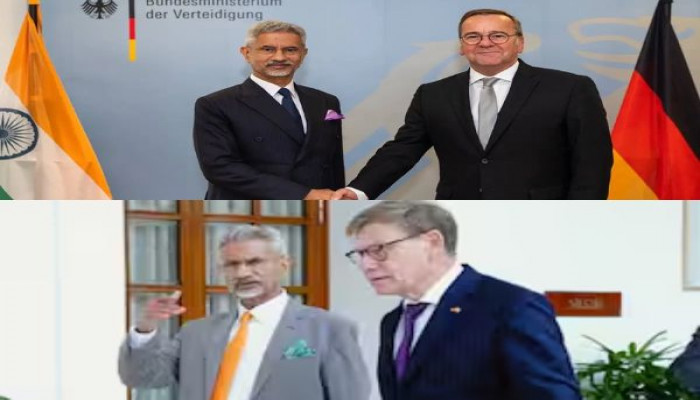‘Predictability has a huge premium in global politics’: EAM Jaishankar on India-German ties
- In Reports
- 06:54 PM, Sep 03, 2025
- Myind Staff
External Affairs Minister S Jaishankar on Wednesday said that in the backdrop of major changes in global strategic and economic conditions, India and Germany will aim to double their bilateral trade while also pressing for an early conclusion of the India-EU free trade agreement.
Trade between the two countries has grown steadily, touching a record level of about $ 33.4 billion or € 28 billion in 2024. Addressing a joint media interaction with German Foreign Minister Johann Wadephul, who is visiting India, Jaishankar noted that his counterpart had earlier conveyed confidence that “we would be doubling our trade” with India.
“Let me assure him that India fully reciprocates that sentiment. We look forward to working with the German government towards this. I want to reiterate that we remain fully committed to continuously improving the ease of doing business in this country. I assured the minister today that any concerns that German companies may have in India — coming to India, establishing themselves, working here, we would be prepared to give it special attention,” Jaishankar said.
The minister remarked that the “changes we see in the world today do influence our policies and do influence the manner in which we approach other countries.” He said that both strategic shifts and economic volatility “make a very powerful case for India and the European Union (EU) and India and Germany to work much more closely with each other,” adding that present circumstances created “a very compelling case for a deeper, stronger, wider India-Germany relationship.”
Jaishankar also said that “predictability has a huge premium in global politics,” in comments seen in the context of India balancing ties with China while dealing with US tariffs. His remarks came after US President Donald Trump criticised India’s economy and announced tariff moves that have affected global trade.
Foreign Minister Wadephul reiterated Germany’s backing for the India-EU free trade agreement, describing India as a “rising economic powerhouse” with “special importance” internationally. He said that more than 200 German companies were operating in India and called the country Germany’s main economic partner in the region. Germany is currently India’s 8th largest trade partner and the 9th largest source of foreign direct investment, with a total of $ 15.11 billion invested between April 2000 and March 2025.
On security matters, Wadephul emphasised that the West’s single demand regarding the Russia-Ukraine conflict was that “weapons fall silent.” He said Russia had “not been willing” to engage in talks despite “enormous efforts” by President Trump, while Ukrainian President Volodymyr Zelenskyy had shown readiness to negotiate.
“We’re talking about a country that has been attacked without having done anything to trigger that attack. The only demand is that weapons fall silent. No more than that,” Wadephul said, adding that Europe wanted to make every possible effort to bring Russian President Vladimir Putin to the table.
India has continued to face scrutiny over its purchase of Russian oil. Jaishankar recently stated that New Delhi should not be “unfairly targeted” over the issue. “Our discussions centred around the Ukraine conflict and its ramifications. India should not be unfairly targeted in that context. We have always advocated dialogue and diplomacy,” he wrote on X following a call with the foreign minister of Finland.
The United States has alleged that India is “funding the war” through its energy trade with Moscow and has imposed tariffs of more than 50 per cent on Indian exports as a penalty. India has described these steps as “unjustified and unreasonable.” During his recent trip to Moscow, Jaishankar stood by New Delhi’s position alongside Russian Foreign Minister Sergey Lavrov and questioned the reasoning behind Washington’s actions.







Comments